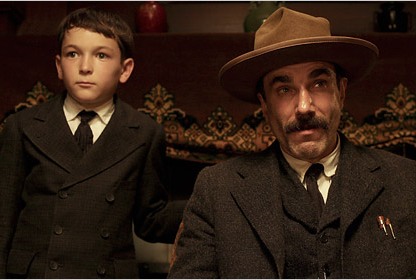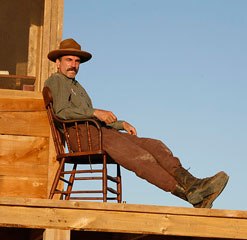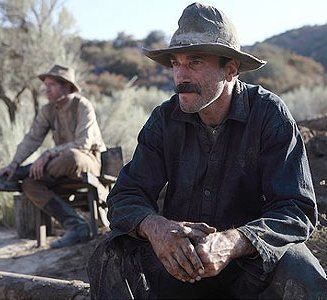 In the opening sequence of Paul Thomas Anderson’s passionate but flawed There Will Be Blood, it is 1898, and a man named Daniel Plainview (Daniel Day-Lewis), alone and driven, casts himself into a dark, dusty hole and hews mineral wealth from the surrounding rock. After suffering a nasty leg injury therein, Plainview hauls himself out of the deep recess through sheer grinding will and, in an act of Herculean exertion rivaling the endgame of Touching the Void, crawls across the sun-baked earth on his back, precious nuggets of silver in hand. This sweating, teeth-gnashing endeavor is an apt metaphor for Anderson’s film. There Will Be Blood looks beautiful, and it has moments of poetry in it. But, like Plainview (and The Assassination of Jesse James, another transplanted 70’s western out this year), it also wears its ambition on its sleeve, and it strains so hard to seem an instant movie classic that it eventually loses its way. (The mostly atonal and distracting Jonny Greenwood score, reminiscent of The Shining, unfortunately doesn’t help.)
In the opening sequence of Paul Thomas Anderson’s passionate but flawed There Will Be Blood, it is 1898, and a man named Daniel Plainview (Daniel Day-Lewis), alone and driven, casts himself into a dark, dusty hole and hews mineral wealth from the surrounding rock. After suffering a nasty leg injury therein, Plainview hauls himself out of the deep recess through sheer grinding will and, in an act of Herculean exertion rivaling the endgame of Touching the Void, crawls across the sun-baked earth on his back, precious nuggets of silver in hand. This sweating, teeth-gnashing endeavor is an apt metaphor for Anderson’s film. There Will Be Blood looks beautiful, and it has moments of poetry in it. But, like Plainview (and The Assassination of Jesse James, another transplanted 70’s western out this year), it also wears its ambition on its sleeve, and it strains so hard to seem an instant movie classic that it eventually loses its way. (The mostly atonal and distracting Jonny Greenwood score, reminiscent of The Shining, unfortunately doesn’t help.)
 Now, in the interest of full disclosure, Paul Thomas Anderson is a director I’ve never warmed to. I thought Boogie Nights was decent but overlong and I had a visceral dislike for both Magnolia and Punch-Drunk Love. (I haven’t seen Hard Eight.) Still, while I think this is Anderson’s best and most accomplished film, and it’s probably worth sitting through for the first third regardless, There Will Be Blood eventually bogs down in some of the usual PTA indulgences. In addition, Daniel Day-Lewis never gives a bad performance and is typically magnetic here, but he also gets more actorly and mannered as the film progresses, and is loonily over-the-top in Blood‘s disastrously misconceived closing moments. (That being said, I wouldn’t be surprised if “I drink YOUR milkshake!” gets some run in the cultural lexicon of useful and memorable movie quotes.) In short, There Will Be Blood is a good film, in some ways even a very good one. But it’s not the landmark masterpiece many reviewers are making it out to be, and it slips into murk well before the end.
Now, in the interest of full disclosure, Paul Thomas Anderson is a director I’ve never warmed to. I thought Boogie Nights was decent but overlong and I had a visceral dislike for both Magnolia and Punch-Drunk Love. (I haven’t seen Hard Eight.) Still, while I think this is Anderson’s best and most accomplished film, and it’s probably worth sitting through for the first third regardless, There Will Be Blood eventually bogs down in some of the usual PTA indulgences. In addition, Daniel Day-Lewis never gives a bad performance and is typically magnetic here, but he also gets more actorly and mannered as the film progresses, and is loonily over-the-top in Blood‘s disastrously misconceived closing moments. (That being said, I wouldn’t be surprised if “I drink YOUR milkshake!” gets some run in the cultural lexicon of useful and memorable movie quotes.) In short, There Will Be Blood is a good film, in some ways even a very good one. But it’s not the landmark masterpiece many reviewers are making it out to be, and it slips into murk well before the end.
 Straying rather far from the Upton Sinclair tome that inspired it, Blood is, in effect, a character study about the dehumanizing consequences of naked ambition. (If that sounds like Citizen Kane, you’re on the right track. PTA is borrowing from Welles, Malick, and Kubrick rather than Altman or Scorsese this time ’round.) After the 1898 prologue, we pick up Daniel Plainview’s story a few years later: He’s moved from silver to oil and has been successful enough to hire on a few workers, one of whom has brought his infant child with him on the dig. Alas, tragedy — a pretty common occurrence in the turn-of-the-century oil business, it seems — strikes at the workplace, and the child becomes Plainview’s. By 1911, this now ten-year-old boy (Dillon Freaser) has become a valuable part of the family business — He’s the silent partner Plainview uses to soften his pitch when dealing with locals or landowners. In any event, the oilman (as he prefers to be known) one day gets a tip from a traveler (Paul Dano) about a town where the black gold literally seeps from the ground. Soon, the Plainviews set up shop in this California hamlet, named Little Boston, and start buying up the place. But standing in his way is another ambitious soul, the evangelical preacher Eli Sunday (also Paul Dano), and he doesn’t want a rival for the town’s admiration. There’s only room for one Great Man in Little Boston…but will his symbol be the Derrick or the Cross?
Straying rather far from the Upton Sinclair tome that inspired it, Blood is, in effect, a character study about the dehumanizing consequences of naked ambition. (If that sounds like Citizen Kane, you’re on the right track. PTA is borrowing from Welles, Malick, and Kubrick rather than Altman or Scorsese this time ’round.) After the 1898 prologue, we pick up Daniel Plainview’s story a few years later: He’s moved from silver to oil and has been successful enough to hire on a few workers, one of whom has brought his infant child with him on the dig. Alas, tragedy — a pretty common occurrence in the turn-of-the-century oil business, it seems — strikes at the workplace, and the child becomes Plainview’s. By 1911, this now ten-year-old boy (Dillon Freaser) has become a valuable part of the family business — He’s the silent partner Plainview uses to soften his pitch when dealing with locals or landowners. In any event, the oilman (as he prefers to be known) one day gets a tip from a traveler (Paul Dano) about a town where the black gold literally seeps from the ground. Soon, the Plainviews set up shop in this California hamlet, named Little Boston, and start buying up the place. But standing in his way is another ambitious soul, the evangelical preacher Eli Sunday (also Paul Dano), and he doesn’t want a rival for the town’s admiration. There’s only room for one Great Man in Little Boston…but will his symbol be the Derrick or the Cross?
 So, as you can see, what we have here is John D. Rockefeller versus Elmer Gantry, commerce versus religion, another virulent intersection of the black gold, texas tea and that old-time fundamentalist religion. But don’t go in expecting Syriana in Progressive Era California just yet. In fact, Blood turns out to be barely political at all. (Somewhere, Sinclair sighs.) Anderson puts several interesting ideas and characters in play, and the first third of the movie is absolutely gripping stuff. But, unfortunately, once all the derricks are in a row, Anderson doesn’t seem to know what to do with them. And so, right around the time Plainview’s first rig goes up in flames, There Will Be Blood begins to stall out. There are some clever reversals in the oilman-churchman balance of power thereafter (the baptism scene, for example), but the movie doesn’t really go anywhere. Instead, for most of the rest of the film, PTA goes back to his well and focuses once again on his pet issue, the meaning and importance of family. (See also Magnolia, Boogie Nights, and, from what I’ve heard, Hard Eight.) He brings a long-lost half-brother (Kevin O’Connor) into the story, has Plainview take extreme umbrage at any suggestion he’s a deadbeat dad, and starts dwelling on the brewing discord and enmity between father and son. (Also a major factor in Oil!, although it’s done rather differently.) Of course, Anderson can be forgiven for concentrating on what most interests him, and plenty of very good directors — maybe even all of ’em — have a tendency to keep ruminating on the same thematic content. Still, given how intriguing There Will Be Blood plays for its first hour, it’s a significant letdown to see PTA fall back into the same old, same old.
So, as you can see, what we have here is John D. Rockefeller versus Elmer Gantry, commerce versus religion, another virulent intersection of the black gold, texas tea and that old-time fundamentalist religion. But don’t go in expecting Syriana in Progressive Era California just yet. In fact, Blood turns out to be barely political at all. (Somewhere, Sinclair sighs.) Anderson puts several interesting ideas and characters in play, and the first third of the movie is absolutely gripping stuff. But, unfortunately, once all the derricks are in a row, Anderson doesn’t seem to know what to do with them. And so, right around the time Plainview’s first rig goes up in flames, There Will Be Blood begins to stall out. There are some clever reversals in the oilman-churchman balance of power thereafter (the baptism scene, for example), but the movie doesn’t really go anywhere. Instead, for most of the rest of the film, PTA goes back to his well and focuses once again on his pet issue, the meaning and importance of family. (See also Magnolia, Boogie Nights, and, from what I’ve heard, Hard Eight.) He brings a long-lost half-brother (Kevin O’Connor) into the story, has Plainview take extreme umbrage at any suggestion he’s a deadbeat dad, and starts dwelling on the brewing discord and enmity between father and son. (Also a major factor in Oil!, although it’s done rather differently.) Of course, Anderson can be forgiven for concentrating on what most interests him, and plenty of very good directors — maybe even all of ’em — have a tendency to keep ruminating on the same thematic content. Still, given how intriguing There Will Be Blood plays for its first hour, it’s a significant letdown to see PTA fall back into the same old, same old.
 Unfortunately, once the spell of Blood is broken, other bad habits of Anderson’s start becoming harder to ignore. Clearly good about giving actors room to breathe (maybe too much room, given DDL’s going off the rails in the final reel here), Anderson can also be distractingly showy (the Scorsese steadicam business in Boogie Nights, for example.) He has a tendency to beat quirky ideas into the ground (Exodus 8:2, the harmonium in Punch-Drunk Love), can hinge a sequence on some really lousy dialogue (“I’m silently judging you“), and often lets scenes meander for several beats too long (anything involving the quiz show in Magnolia.) These tics are more subdued in There Will Be Blood than in any of Anderson’s previous movies, but they become manifest as the film loses focus, and well up with explosive force in the last act. Set in 1927, with Plainview now a wealthy but dissolute drunk in his own Xanadu and Sunday an Aimee Semple McPherson of sorts, the final showdown between our two antagonists is a misfire on multiple levels. Not to give the story away, but the scene relies on far too many suspensions of disbelief. (Why would Sunday come to Plainview, of all people? Would Sunday really not get it beforehand? And, how the heck did he lose money in the stock market in 1927? Note this site: “From 1926 to 1929, the market indices moved up nearly 400%.“) Worse, both Day-Lewis and Dano start blatantly overacting. (Somebody please take that plate of chicken away.) And, what with the bowling alley and milkshakes and whatnot, the last act of There Will Be Blood even comes across as downright silly. It’s an ignominious end for a film that, for its first hour or so, had all the makings of a masterpiece. But, sadly, the gears end up grinding too loudly on this rig, and, just as pride goeth before a fall, it all eventually comes to a crash. Oil is a tricky business.
Unfortunately, once the spell of Blood is broken, other bad habits of Anderson’s start becoming harder to ignore. Clearly good about giving actors room to breathe (maybe too much room, given DDL’s going off the rails in the final reel here), Anderson can also be distractingly showy (the Scorsese steadicam business in Boogie Nights, for example.) He has a tendency to beat quirky ideas into the ground (Exodus 8:2, the harmonium in Punch-Drunk Love), can hinge a sequence on some really lousy dialogue (“I’m silently judging you“), and often lets scenes meander for several beats too long (anything involving the quiz show in Magnolia.) These tics are more subdued in There Will Be Blood than in any of Anderson’s previous movies, but they become manifest as the film loses focus, and well up with explosive force in the last act. Set in 1927, with Plainview now a wealthy but dissolute drunk in his own Xanadu and Sunday an Aimee Semple McPherson of sorts, the final showdown between our two antagonists is a misfire on multiple levels. Not to give the story away, but the scene relies on far too many suspensions of disbelief. (Why would Sunday come to Plainview, of all people? Would Sunday really not get it beforehand? And, how the heck did he lose money in the stock market in 1927? Note this site: “From 1926 to 1929, the market indices moved up nearly 400%.“) Worse, both Day-Lewis and Dano start blatantly overacting. (Somebody please take that plate of chicken away.) And, what with the bowling alley and milkshakes and whatnot, the last act of There Will Be Blood even comes across as downright silly. It’s an ignominious end for a film that, for its first hour or so, had all the makings of a masterpiece. But, sadly, the gears end up grinding too loudly on this rig, and, just as pride goeth before a fall, it all eventually comes to a crash. Oil is a tricky business.
